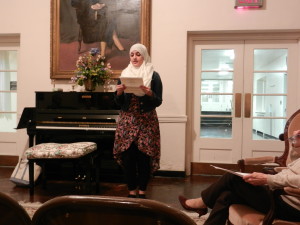Poetry reading highlights cultural diversity within campus community

Wilson held the annual multilingual poetry reading on Saturday, Nov. 16. It has been held twice each year at Wilson since 1995. Around 21 people shared their poems, including the event coordinator José Hernán Córdova, chair of the foreign languages department and Spanish professor at Wilson. A few others were also in attendance as listeners; anyone was welcome to attend the reading. The poems were read in a variety of different languages, from Arabic to Korean to Russian to French, as well as a few included in English.
“Ce te quiero?” were the words of the first poem of the poetry reading, recited by Thomas Seward, a good friend of Dr. Córdova who attended and participated in the reading. He recited poems in Spanish and French. Amanda McMenamin, assistant professor of Spanish at Wilson, also contributed poems in Spanish and French.
Many students, including Katelyn Wingerd ’16, Hanna Al-Hamdani ’17, and Stephanie Laurent ’17 recited poems.
Wingerd recited a poem she read with her spanish class.
“I really enjoyed it and wanted to share it,” she commented when asked why she chose her particular poem.
Al-Hamdani was one of three people that shared a poem in Arabic. She admitted it was a bit terrifying reciting the poem in front of everyone, but in the end was glad she did it and enjoyed hearing all the languages represented.
“It was a great experience. It was a lot of fun,” she said.
Laurent recited the well-known French fable, “Le Corbeau et Le Renard,” otherwise known as “The Fox and The Crow.” When introducing the poem, she admitted that it was one of her favorites.
International student Suhhee Song was the only student to recite a poem in Korean, and a few other students spoke unique languages including Urdu, Chinese and Nepali.
Dr. Córdova himself shared a few poems. He hoped that students and other future attendees gain an experience.
“What I hope is that people will come and will participate with an attitude of openness and receptivity–or poetic solidarity,” said Dr. Cordova. “The fact is that this is a somewhat babelic experience, and, if any meaning is communicated, it is only to those who speak the language in which the poem has been articulated. I myself want to hear the sounds of other languages, the music, rhythms and cadences of foreign poems, even if I do not understand what they say. But isn’t meaning sometimes elusive even in our own language?”
“It’s a great way to show culture and give it a try,” Wingerd said. “It was a very interesting and eye-opening experience.”
Al-Hamdani admits that she felt a bit pressured to share the poem she shared from the suggestion of Dr. Córdova, but put in a good word and agreed that other students should participate as well.
The next multilingual poetry will be held in the spring, but there is nothing to fear. “Signs of spring are all around, don’t let the cold get you down,” famous poet Connie Webb wrote. For more information contact Dr. Cordova at jose.cordova@wilson.edu.
